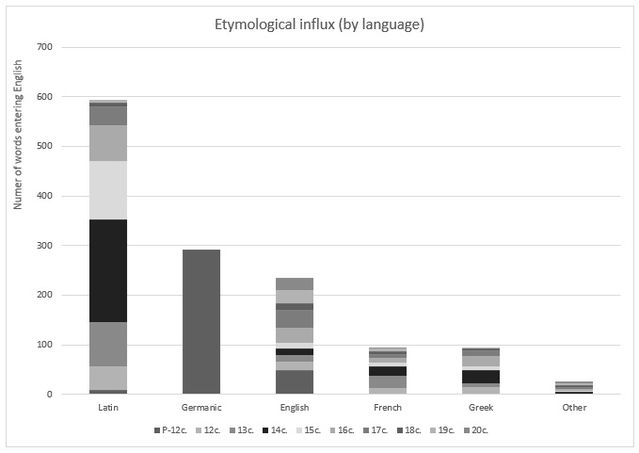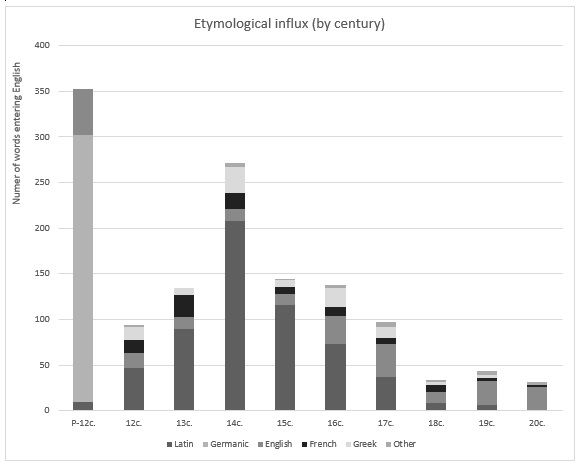Cognition
Where Does the Language of Psychology Come From?
New research reveals the non-English origins of many concepts.
Posted May 28, 2019

The Origins of Psychology
Have you ever wondered where psychology comes from? I don’t mean its modern empirical beginnings in Wilhelm Wundt’s institute in the late 19th Century. I mean the word itself. It’s quite a circuitous tale. Its roots are the classical Greek terms psykhe (encompassing meanings such as breath, thought, spirit, and soul) and logia (the study of a given phenomenon). But the term itself is widely believed to have been coined in the 16th century – using Latinised versions of the Greek roots – by Philip Melanchthon, a German Lutheran theologian, to describe the 'study of the soul'1. However, its usage in a specific psychological sense – untethered from philosophical or religious discourse – was not popularized until the 18th century with Christian Wolff’s Psychologia Empirica. Even then, English-speaking scholars still tended to use 'mental philosophy' to describe the study and understanding of the mind, and not until the mid-19th century did the Anglicized 'psychology' begin to be widely adopted2.
Strikingly, this kind of historical meandering and cultural cross-pollination is hardly limited to the word psychology: The entire field is similarly the product of many centuries of words and ideas being shared, transmitted, and ‘borrowed’ across languages. My new study, just published in The Journal of Positive Psychology, shows how deep and widespread is this process of borrowing3. It is frequently remarked that America is a ‘melting pot’ of diverse cultural influences and traditions. Less often acknowledged is the way this also applies to the English language, and hence to its various specialized areas of discourse—like psychology. Before getting into the details of the study though, let’s take a step back to briefly consider the nature and evolution of English itself.
The Multicultural Origins of English
The roots of English lie in the Proto-Germanic languages, which began to diversify from the Indo-European tree around 500 BCE. What we now call English subsequently emerged from the migration of three Germanic tribes – the Angles, the Saxons, and the Jutes – to the British Isles around the 5th Century CE, whereupon their West Germanic language supplanted the extant languages of Roman Britain (e.g., Latin and Brittonic). This emergent 'English' subsequently evolved through three main phases: Old English (circa 450 – 1100 CE); Middle English (1100-1500); and Modern English. Much of this evolution consisted of lexicalisation (adding new words and phrases to the lexicon), which raises several key questions.
The first is, where do new words come from? Sometimes this involves coining new words or adapting existing words in innovative ways. An example of the latter is ‘boredom,’ which entered the language when Charles Dickens creatively deployed the verb ‘to bore’ – pierce or wear down – to depict his protagonist’s apathetic state. More often though words are ‘borrowed’ (an inelegant but nevertheless widely used term) from other languages. Of course, Old English itself mostly constitutes the importation of an entire West Germanic lexicon. The Norman invasion from 1066 onwards then inaugurated a new era of evolution – Middle English – as the conquerors’ French language came to dominate. English eventually regained its prominence, but now with many French words added. Of course, French itself had roots in, and borrowings from, other languages, like Latin and Arabic, just as these languages too had their own sources, such as the Greek influence upon Latin. The era of Modern English then saw direct borrowing from many languages as these became more widely available in published works, particularly Greek and Latin. Indeed, English truly is a melting pot of borrowed words. Of the more than 600,000 lexemes in the Oxford English Dictionary, the percentage of borrowed words – also known as ‘loanwords’ – is estimated at between 32%4 and 41%5.
Perhaps even more intriguing than where words come from is the issue of why they are borrowed. In many cases, the answer is because the language lacks its own precise equivalent – with the foreign word thus being ‘untranslatable’6. This might occur, for instance, when a new invention, practice, or idea is introduced to a culture. So, in the absence of an appropriate native word – or a new word being coined – the loanword is taken up because it is cognitively and socially useful, allowing speakers to articulate ideas they struggled to with their existing lexicon. Such words, therefore, fill ‘semantic gaps,’ i.e., “the lack of a convenient word to express what [one] wants to speak about”7. Such gaps are what make words untranslatable, indicating phenomena that have been overlooked or undervalued by one’s own culture, but which another culture has identified and labeled. As a result, a borrowed word can fill a semantic gap. Corroborating this point, most borrowed words belong to categories susceptible to the introduction of novel ideas and practices, such as religion and belief (of which 41% of English words are estimated to be loanwords), and clothing and grooming (39%), whereas aspects of life less susceptible to such innovation have far less borrowing, such as the body (14%), spatial relations (14%) and sense perception (11%)8.
The Multicultural Origins of Psychology
So, English has been greatly enhanced over the centuries by the importation of loanwords. These have augmented the lexicon in all areas of life, enriching English-speakers’ ability to conceptualize and understand any given phenomenon. This includes our understating of mind and behavior – a realm of knowledge which in recent centuries has come to be known as ‘psychology,’ as elucidated above. This realization somewhat casts the field in an intriguing new light. That is, despite being an international endeavor, psychology is often criticized as being relatively Western-centric9. This Western-centricity can be traced to the more general economic, military, and cultural dominance of the United States in the second half of the 20th century, which meant that concepts, ideologies, priorities, and methods associated with psychology as practiced in the US came to dominate the international scene10.
A pertinent example of this dominance is that research, theorizing, and communication (e.g., in international conferences and journals) is mainly conducted in English, which influences the field’s conceptualization and understanding of its subject matter, with most of its ideas and theories structured around the contours of the English language11. For example, if a concept has not been identified and labeled in English, then it is unlikely to be a topic of study in the field, and in a sense may not even 'exist' for many scholars. The more general theoretical context to this point is the ‘linguistic relativity hypothesis,’ which broadly speaking holds that language strongly shapes how people experience and understand the world. If English is, therefore, the default tongue of the field, then the knowledge it produces will to an extent be provincial and culturally-specific.
Intriguingly, though, this critique is somewhat punctured by the notion that English itself – and psychology, too, therefore – has borrowed heavily from other languages to enrich its lexicon. To an extent, then, psychology is already a multicultural creation (even if only in a limited sense, and so would benefit greatly from yet further cross-cultural engagement).
To explore the extent to which psychology is indeed a multi-cultural product, I conducted an etymological analysis of words used in the field. To render my inquiry manageable, I focused on well-being in particular (this being my own area of scholarship). As a case study, I selected a seminal article from positive psychology, namely Seligman and Csikszentmihalyi’s paper, Positive Psychology: An Introduction12, published in American Psychologist in 2000, which essentially inaugurated this emergent field. My approach was to identify the etymology of every word in the main text of the article using the prominent and widely-used online etymology dictionary (www.etymonline.com).
A Linguistic "Melting Pot"
Through the search methods outlined above, 1333 distinct lexemes were identified in the paper (of which, 160 could be deemed specifically psychological concepts). The results are illuminating in revealing the diverse etymological roots of mainstream psychology, and indeed of English more broadly. ‘Native’ English words – belonging either to the Germanic language from which English emerged, or originating as neologisms in English itself – comprise only 39.4% of the sample (and 38% of the psychological words). Thus, over 60% of the general words (and 62% of psychological words) are loanwords, borrowed from other languages at some point in the development of English. Of these, the largest contributor is Latin, providing 44.5% of all words (and 44.4% of psychological words), followed by French (7% of all words, and 6.7% of psychological words), and Greek (7% and 7.4%). The remainder were provided by modern German (0.7% and 2.4%), Old Norse (0.5% and 0%), Italian (0.4% and 1.2%), and finally Arabic, Dutch, and Scottish (all 0.1% and 0%).
These figures highlight the potent ‘foreign’ influence on English (even leaving aside the fact that English is mostly an imported Germanic tongue). This influence is even more marked when one considers that, of the 234 words treated in the analysis as English in origin, 122 (52.1%) are neologisms created from lexemes from other languages (mainly Latin and Greek). If such words were also to be deemed loanwords (or at least, loan adaptations), the number of borrowed words rises from 808 (60.6%) to 930 (70%).
The two graphs below set out these basic findings. The first shows the influx of words according to the language of origin (with the century in which they entered English as stacks within them). The second reverses this, showing the influx of words according to the century of entry (with the origin languages as stacks).


In this way was the English language – and therefore psychology – greatly enriched. Sometimes words were embraced for emergent psychological theories and practices, whereas other borrowed items helped name processes and qualities that people were perhaps already aware of but lacked a specific label for. An example of the former is the term ‘psychoanalysis,’ which had a rather complex provenance. It was coined by Freud in 1894 as psychische analyse, using the Latinized form of the aforementioned Greek term psykhe, together with the German term analyse (which itself stemmed from the Greek analysis). This was then rendered by Freud in a French translation of his work in 1896 as psychoanalyse, which itself became Anglicized in 1906 with the translation of his work into English. In such a way do new concepts come into being – in this instance, signifying new forms of therapeutic praxis developed by Freud and others – thus enriching the language. An instance of the latter (naming something that is already known in some form) is the term 'altruism,' widely thought to have been coined (or at least popularized) in 1830 as altruisme by the French philosopher August Comte. It combined the French term utrui – meaning of or to others, from the Latin alter, meaning other – with the suffix isme, and entered English in 1853 in its Anglicized form. So, whereas psychoanalysis served to denote new forms of therapies emerging in that era, the coinage of terms like altruism helped to acknowledge and conceptualize 'new' forms of attitude and behavior (which may have existed for centuries but had previously been uncodified).
The Value of (Further) Cross-Cultural Engagement
In these ways does our understanding of life become complexified and enriched. In that respect, one can make the case that English-speaking psychology would do well to more consciously and actively engage with other languages and cultures. Its understanding of the mind has benefited greatly from English incorporating loanwords over the centuries. If one accepts that premise, it follows that psychology would continue to develop from this kind of cross-cultural engagement and borrowing – including, of course, through collaboration with scholars from non-English speaking cultures themselves. One such way in which the field might develop is through inquiring into untranslatable words, since these constitute clear candidates for borrowing (given that they lack an exact equivalent in English). I myself have sought to promote this kind of endeavor, with my ongoing creation of a cross-cultural lexicography of untranslatable words relating to well-being13.
The project is centered on the idea that whereas engaging with ideas from other cultures has hitherto been rather arbitrary and haphazard, it could ideally be done in a more systematic and comprehensive manner. This would provide insights into how other non-English speaking cultures understand and experience life, thus countering the Western-centricity of mainstream psychology, and opening space for greater consideration of cultural difference and diversity. It would moreover mean enhancing the nomological network of concepts in the field, leading to a more detailed and comprehensive understanding of the mind and its functions, not only with respect to well-being but in all areas of life. Indeed, the project has already yielded analyses of topics including positive emotions14, ambivalent emotions15, love16, prosociality17, character18, and spirituality19. The etymological investigation in this most recent paper makes the case for further such endeavors, helping the field to continue to evolve over the years ahead.
References
[1] Pitkin, B. (2004). The Protestant Zeno: Calvin and the Development of Melanchthon’s Anthropology. The Journal of religion, 84(3), 345-378.
[2] Danziger, K. (1997). Naming the mind: How psychology found its language. London: Sage
[3] Lomas, T. (2019). Etymologies of wellbeing: Exploring the non-English roots of English words used in positive psychology. The Journal of Positive Psychology. doi: 10.1080/17439760.2019.1615107
[4] Durkin, P. (2014). Borrowed Words: A History of Loanwords in English. Oxford: Oxford University Press.
[5] Tadmor, U. (2009). Loanwords in the world’s languages: Findings and results. In M. Haspelmath & U. Tadmor (Eds.), Loanwords in the world’s languages: A comparative handbook (pp. 55-75). Berlin: De Gruyter Martin.
[6] Lomas, T. (2018). Experiential cartography, and the significance of untranslatable words. Theory & Psychology, 28(4), 476–495
[7] Lehrer, A. (1974). Semantic fields and lexical structures. Amsterdam: North-Holland Publishing Co, p.105
[8] Tadmor, U. (2009). Loanwords in the world’s languages: Findings and results. In M. Haspelmath & U. Tadmor (Eds.), Loanwords in the world’s languages: A comparative handbook (pp. 55-75). Berlin: De Gruyter Martin.
[9] Henrich, J., Heine, S. J., & Norenzayan, A. (2010). Most people are not WEIRD. Nature, 466(7302), 29-29.
[10] Danziger, K. (2006). Universalism and indigenization in the history of modern psychology. In A. C. Brock (Ed.), Internationalizing the history of psychology (pp. 208–225). New York: New York University Press.
[11] Lomas, T. (2018). Experiential cartography, and the significance of untranslatable words. Theory & Psychology, 28(4), 476–495
[12] Seligman, M. E. P., & Csikszentmihalyi, M. (2000). Positive psychology: An introduction. American Psychologist, 55(1), 5-14.
[13] Lomas, T. (2016). Towards a positive cross-cultural lexicography: Enriching our emotional landscape through 216 ‘untranslatable’ words pertaining to wellbeing. The Journal of Positive Psychology, 11(5), 546-558.
[14] Lomas, T. (2017). The spectrum of positive affect: A cross-cultural lexical analysis. International Journal of Wellbeing, 7(3), 1-18.
[15] Lomas, T. (2018). The value of ambivalent emotions: A cross-cultural lexical analysis. Qualitative Research in Psychology. doi: 10.1080/14780887.2017.1400143
[16] Lomas, T. (2018). The flavours of love: A cross-cultural lexical analysis. Journal for the Theory of Social Behaviour, 48(1), 134-152.
[17] Lomas, T. (2018). The dimensions of prosociality: A cross-cultural lexical analysis. Current Psychology. doi: 10.1007/s12144-018-0067-5
[18] Lomas, T. (2019). The roots of virtue: A cross-cultural lexical analysis. Journal of Happiness Studies, 20(4), 1259-1279.
[19] Lomas, T. (2019). The dynamics of spirituality: A cross-cultural lexical analysis. Psychology of Religion and Spirituality, 11(2), 131-140.




